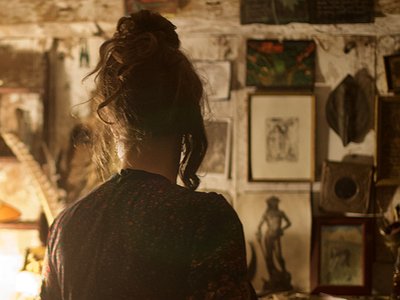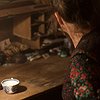Part 1
Name: Genese Grill
Nationality: American
Occupation: Artist, writer, translator
Recommendations: I recently discovered Freya Stark’s book of essays, Perseus in the Wind. She was a British and Italian travel writer, who mostly sojourned in the Middle East, and who lived to be a hundred years old. Her writing, filled with extraordinary imagery and ideas, is spectacular and spectacularly under-appreciated.
I also don’t know why more people are not listening to Aurora, a magical young genius from Norway, whose first album, All My Demons Greeting Me as a Friend is astonishing.
If you enjoyed this interview with Genese Grill, visit her expansive website to find out more. She also has a twitter account.
When did you start writing- and what or who were your early passions and influences? What is there about literature and writing that drew you to it?
My father is a poet and my mother an avid reader (now a writer, too), and our house was filled with books. I guess I was lonely and a little alienated from my peers. Finding my best friends in books, I dreamed of becoming a writer; in part, because books had meant so much to me. I wanted to be a part of the conversation of the ages. To give something back, in a sense, to those who had given me so much. And to speak to others out there somewhere or even in the future who might need to hear the voice of someone else who did not quite fit in. Also, of course, I have been and continue to be motivated by the way the world is—beautiful and terrible at once.
My early passions and influences are too many to name in full, but I remember going crazy for Jane Eyre as a young woman and gasping when I got to the last line of This Side of Paradise because, for the first time, I was aware of what a sentence could do. In high school I read hordes of English novels, and then I moved on to French decadence. Soon I was on to Dostoevsky, and the Russians, and then to Kafka, Nietzsche, Goethe, Emerson, Thoreau, Walter Pater. Shakespeare, of course. I loved Anais Nin’s diaries and erotica as a young girl. And for the longest time, I used to say that Yeats’ Mythologies was my favorite book of all. It may still be.
It seems I developed a taste early on for books that dealt with conflict, passion, intensity, aliveness.
For most artists, originality is preceded by a phase of learning and, often, emulating others. What was this like for you: How would you describe your own development as an artist and the transition towards your own voice?
As many before me have noted, one’s voice sort of overtakes one and that irrepressible persistence of style and idiolect ensures a certain originality even when one is trying to write like someone else or in some other way.
I have certainly been very influenced by other writers and thinkers, but the force has mostly been subconscious, almost visceral, as rhythms and dynamics get into one’s system over time while reading and also after much translating. I tend to list nouns in groups of twos and threes. I think I got that from Walter Pater. I may sometimes be vague in my designations, suggesting rather than specifying. I may have gotten that from Yeats’ essays. I dare to complexify at the risk of losing my reader. I must have got that from Musil.
But I never really planned on writing the kinds of things I write. I would rather write novels, and I do try, but essays come out. And they happen in a very particular way, not of my choosing ... perhaps a result of my years as an academic somehow interacting with my years rebelling against being an academic? In any case, they grow out of themselves, organically, inefficiently, by inspiration after long bouts of research and self-questioning.
I think a writer has to sort of grope about in different idioms until she lands in some form that seems fitting for what she has to express. The content has to find the form or the form the content.
How do you feel your sense of identity influences your creativity?
I think a writer’s first task is to be true to herself. To not try to be like anyone else or please anyone else.
The self, though, is a rather irreducible entity, no? We are all made up of so many influences, experiences, circumstances. If you are asking whether being a woman, descended from Eastern European Jews has influenced my creativity—well, certainly, there is a certain heritage and legacy I hearken to. But the artistic Self also gravitates to what Yeats called “the anti-self,” and flirts with the Other, the distant, the strange in fruitful ways.
Contemporary notions of appropriation are, I believe, destructive and limiting; the idea that a person of a certain gender, class, or race may only write about himself or herself is fundamentally anti-artistic, is devastating to the imagination. And imagination is one of the most important aspects, not only of art but of humanity. The artist must be “vast, contain multitudes,” as Whitman had it, spanning the distance between Self and Other.
What were your main creative challenges in the beginning and how have they changed over time?
When I was younger, I wanted to write (and paint), but I did not have anything to say. I had no content, or could not access it. I had to read and read and read and to experience life more, take notes, ask questions, dare to think the unthinkable, dwell in discomfort and find my way out into some small patches of light again and again.
Over time, I found I had to write: in order to make some sense of the world, and found myself observing and analyzing everything I saw and experienced with an eye to explaining a growing list of existential and aesthetic questions that persistently plagued me. I found that other writers I loved might not satisfactorily address my particular obsessions or their conclusions spurred me on to dig more deeply or to argue against them. I had to combine the bits that others had gathered and chosen in order to approach my own quandaries. Sort of as a scientist works, I suppose, with the discoveries of his or her predecessors?
I find now that I often am driven to write by what I perceive to be common misconceptions and unexamined cognitive dissonances in other books or in contemporary discourse. There is now so much to write about, no dearth of content at all. I write now about what fascinates me, confounds me, disturbs me. It is endless, but luckily, every stream of thought is just a metaphor for the others I may never get to. All of them attempt to answer the same basic questions: what does it mean to be alive? How should one live? Why is the world both beautiful and terrible? What is the relationship between form and meanings? Outside and inside? Real and imaginary? And so on.
How do you see the relationship between style, form, plot and storytelling – and how would you rate their importance for you, respectively?
My essays do sometimes involve storytelling and plot, I suppose, and certainly style and form are extremely important to my writing. The ideas sometimes (often) threaten to make an essay unreadable, but the whole point is to form-ulate them in such a way as to make them intelligible, memorable, felt, at least temporarily held in the vessel of the essay.
That tentative arrangement is a station for pause, for a certain peace; it is a formal respite from the jangling and jagged edges of confusion and chaos. And such a respite is best created through the artful arrangement of elements: the rhythm of words, the dynamic of short and long sentences, lyrical and analytical, narrative and abstract parts, by shifting between personal and “objective,” between experience and research.
Sometimes I am very aware of the way that rhetorical devices can make something seem more true than it may actually be; but I mostly believe that I am using the emotive forces of style and poetry in the interest of truth(s)!
Observation and research are often quoted as important elements of the writing process. Can you tell us a bit about your perspective on them?
As mentioned above, I do an enormous amount of research before beginning a piece. I read much more than I write. And I take copious notes. I look for details that will illustrate or challenge what I intuited when I started exploring some question. I look for complexifications and relationships between ideas. I look, in a sense, for a certain number of analogous situations or fields of study or images that illuminate the knot or problem at the heart of whatever it is I am exploring. I weave the book-research in with life-research, with observation and personal experience.
When I am working on an essay, I carry the questions around with me for months and months (sometimes years), and everything I read, see, hear, observe becomes material for the essay.
How do you see the relationship between conscious planning and tapping into the subconscious; between improvisation and composition? When dealing with the end of a story, for example, do you tend to minutely map it out or follow the logic of the narrative as it unfolds itself?
My process is very intuitive and messy, but I return again and again to the basic questions I am asking for the particular piece. The questions provide the frame, though even they change as I progress through a particular piece of writing. The material and the organizations happen organically. Sometimes I know that I will be using a certain anecdote or an especially juicy idea or image, but I usually don’t know where until I am “making” the essay, putting all the parts together.
Often, I have to wait for the inspiration for the ending or the beginning. I have to be in a certain “state,” and when I am I can “discover” what I need by getting away from the desk and taking a walk or looking at some seemingly unrelated book. Since my subconscious is already always involved in the questions, I may readily find some connection between some seemingly random thing and what I am working on. In such states, everything is connected; but I have to work to make the connections vivid for the reader.
I wouldn’t be interested in writing if I already knew before I started what I was going to say or how I was going to say it. It has to be a process of discovery.






